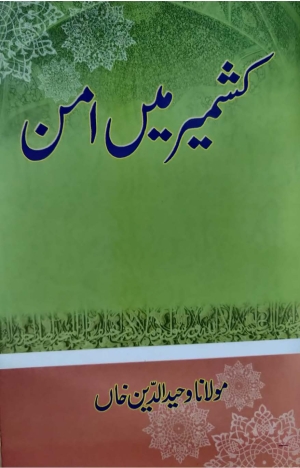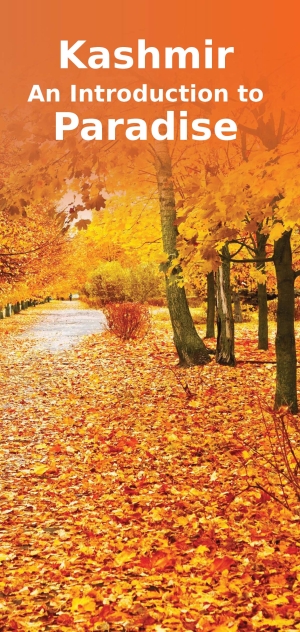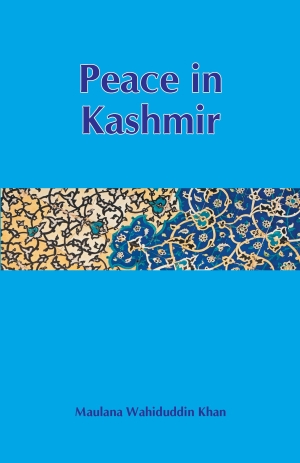The modern age is the age of peace. Today everything one wants can be achieved by treading the path of peace. For their growth and advancement to occur, Kashmiris should reassess their past and chart a new course for themselves to build their future on peaceful lines. This programme should be based on three points: education, economic development, and spreading the message of peace, harmony, and spirituality to the people. For their futuristic goals, Kashmiris should completely abandon politics and the path of armed struggle. Instead, they must set the feet of this whole generation on the education path. To this end, they should focus their attention on building high-class educational institutions. For at least 25 years, they should spend all their energies on the field of education.
So far as the economic field is concerned, there are extraordinary opportunities for business and industry in the state. Kashmiris must productively use the vast economic and other resources that are still lying untapped to a large extent. The third field is communicating the message of peace and spirituality among the people. If peace prevails in Kashmir, the tourism industry will flourish. It will be an excellent opportunity for the Kashmiris to spread the message of peace and spirituality to the world, contributing to success in both this world and the next. If Kashmiris follow this three-point formula, peace will prevail in Kashmir.
Featured Articles
Featured Videos
FAQs
On September 10, 2014, The Times of India carried a front-page report titled: “In Kashmir, ‘occupation force’ hailed as saviour." The report said that from being perceived by many in the Kashmir valley as an “occupation force” in the 1990s, the Army is now seen as a “humanitarian agency”. The Army has certainly come a long way in this militancy-hit state, having rescued upwards of 100,000 people.
To my surprise, the same morning I received a much-awaited call from our Kashmir team member who told the same story. He affirmed that after the great havoc wreaked by the floods, normalcy was slowly being restored. He attributed this entirely to the efforts of the Indian Army and said that there was new thinking emerging among the people of Kashmir about the armed forces. In his own words, he said: “Jis army ko hamne patthar mara tha, wahi aaj apne kandhon par utha kar logon ko flood se bacha rahe hain.” (The same army which was pelted with stones is now rescuing people from the flood on their shoulders).
Sometimes blessings come in disguise. The recent flood crisis in Kashmir is an example of this old saying. The whole state of Jammu and Kashmir was almost underwater. A massive rescue and relief operation by the Indian armed forces is on in the state. It was this same Indian Army that was subjected to stone-throwing that is now dropping food packets, saving the lives of people, and extending all possible help.
For a very long time, Kashmir had been a symbol of Hindu-Muslim unity. A large number of Hindus used to visit the Sufi shrines in Kashmir. There was an ideal relationship between the Hindu Pandits’ and the Muslim Kashmiris. In the whole state of Jammu and Kashmir, Hindus and Muslims lived in brotherly relations and cooperated with each other in every field. Kashmir was in an ideal state of communal harmony. There was absolutely no problem between the Kashmiris and the Hindus.
But, due to misguidance from rabble-rousers, the Kashmiri people temporarily became negative towards India. This kind of negativity was totally against the spirit of Kashmir.
Now, nature, through this calamity and the help provided by India, is giving a strong message to Kashmiris: ‘See the realities and change your mindset.’ This “change” is not merely a change—it is a return to their own past.
Under the influence of their so-called leaders, Kashmiris had become negative towards India. However, India is the only country that has rushed to their rescue. A crisis reveals a person’s friends and enemies. This calamity has clearly shown that the Indian Army is a true friend and well-wisher of the Kashmiri people. This was a new experience in the recent history of Kashmir. According to my assessment, it was a message from nature. Nature is telling them: ‘Discover your real friends.’
The fact remains that, after Independence, there was a great chance for Kashmiris to develop and build a great future for themselves. But, because of misguidance from some leaders, they were living in a state of indecisiveness. In this natural calamity, there is a lesson for the Kashmiri people: ‘Decide your future without delay, so that your journey towards the future continues without any hurdles and your youth can avail of all modern opportunities.’
Source: Spirit of Islam October 2014
We wanted to change the mindset of the Kashmiri people, who were trying to change the political status quo in Kashmir through militancy. However, we constantly made them believe that this was an impossible game. We have to accept the reality. One example of this method is set forth in our book, which has been published in 'Subh-e-Kashmir' (Urdu), and in 'Dawn Over Kashmir' (English). Now, it is a well-established fact that the Kashmiris have almost abandoned their previous way of thinking and, by and large, there is peace in Kashmir. This change is a direct result of our mission. If any violent incident occurs in Kashmir, it is due to foreign elements.
This mission that I call Neo-Gandhism is applicable to all the people of India. Its method is based on education and not on militancy. In pre-independence India, the course resorted to was mob activism. This should now be replaced by educational activism. This method seems to be a long-term method. Such a goal can be achieved only through long-term planning. Short-term planning will be of no avail.
Neo-Gandhism is not a departure from the Gandhian ideology. In fact, it is reapplying the Gandhian ideology in a changing world. This kind of reapplication is common to the history of all systems and ideologies. In the pre-independence era, there were two parties: the Indian nation and the British occupiers. This was a 'we-they' equation; so the basic target of Gandhism was to oust the British from the Indian soil, which happened successfully on August 15, 1947.
Now the situation is completely different. Now, there is no 'they'; all are members of the Indian nation. The present situation is based on a 'we-we' equation, and not a 'we-they' equation as it was in the past.
Source: Spirit of Islam June 2013
For centuries Kashmir has been known as ‘heaven on earth’. In the past, Kashmir was ruled by a series of rulers who were not indigenous inhabitants of the land—Pathans, Mughals, Sikhs and Dogras. But throughout this period it still remained ‘heaven on earth’. People from all over the world visited Kashmir. If the Taj Mahal symbolized architectural beauty on the subcontinent, Kashmir was the symbol of the beauty of nature. This history shows that for Kashmir to make progress, it is not necessary that it should be ruled by Kashmiris. Political power is a kind of political headache. Kashmir needs constructive activities to be revived for its progress, and development, and nothing else.
The Quran mentions everything that is good for man. But it does not mention freedom or liberty. This shows that the word freedom is very deceptive. It has no real meaningfulness. A clear practical example of this can be seen in 60 Muslim countries, most of which won their political independence after a long struggle, in the course of which their people made immense sacrifices. However, in fact, these countries are not really independent in the true sense of the term. Many of them are now in the throes of civil war, where rival groups are fighting each other for power. If the Kashmiris do not realize this and stop insisting on independence, they are likely to meet the same unenviable fate. That is why they should abandon their present political struggle and, instead, concentrate on the work of positive and constructive development.
Had Kashmir treaded along the path of educational and economic advancement, today it would have been a model of progress and prosperity. But the incompetent leadership, with unrealistic dreams and empty slogans, have caused terrible damage. The time has now come for the Kashmiris to abandon the path of militancy completely and permanently, and, instead, to adopt the path of peace and progress. Only then can the dream of Kashmir as ‘heaven on earth’ come true. Unrealistic politics has played havoc with Kashmir, but now through realistic politics we can once again lead Kashmir to progress and development. Kashmiri Muslims have today become disillusioned. They are living in an atmosphere of mistrust.
It is indeed possible for the Kashmiris to start a new life at any given time, but for this, two conditions must be met. First, they must take responsibility for the unpleasant situation they are faced with today. Second, more importantly, they must come out of their delusional world and learn to live in the world of practical realities. They must understand that today it is the age of peace.
Source: Spirit of Islam December 2018









